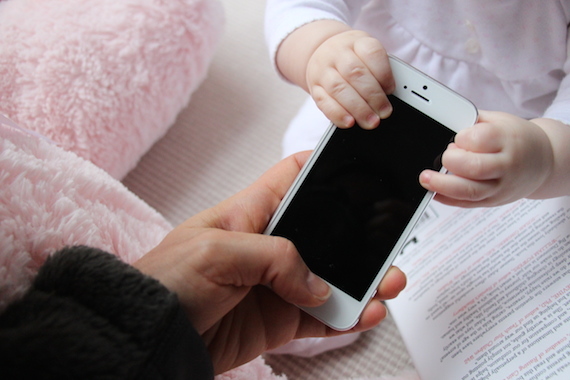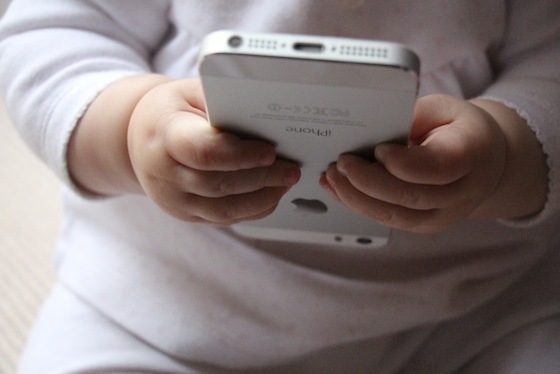I consider myself to be a particularly hands-on stay-at-home mom of three. I rarely miss a pick-up or drop-off at school. I eat with the kids almost every meal. I chaperone their field trips, attend their school chapels, and try to be a shout away from them at home. But I do all of it holding my phone.
I went to a lecture recently by a woman who I wish was my therapist. In just an hour, Catherine Steiner-Adair, Ed.D., a Boston-based, soft-spoken, clinical psychologist and co-author of The Big Disconnect: Protecting Family and Childhood Relationships in the Digital Age, got me to rethink my entire approach to parenting.
My iPhone is another member of our family. My kids know my number by heart. They've figured out how to unlock the keypad to take pictures. They help me search for it 10 times a day. They know I'm always "just checking" or "doing one quick thing," hurriedly pinging with my clunky index fingers like a beginning typist. I'm no worse than anyone else I know. I don't breech social etiquette. But I often do a quick email triage right in front of the kids.
When I'm checking my phone or emailing on my computer, I know I'm not at my best as a mom. I kind of hear the kids' voices clamoring for my attention as I focus on the task at hand (or at fingertip), but not really. I know I tell them to "hold on," and I don't always say it so nicely. I can't seem to think and talk. They have to wait a minute. Mommy is busy. I'm physically there, but I'm an absentee mom. I'm like a crack addict, stopping whatever I'm doing with them if I hear the ping of a text. But then, wait, kids? Where'd you go?
According to Steiner-Adair, I'm not alone. She suggests comparing how you respond to being interrupted in the middle of scrambling eggs to being interrupted while finishing an email. Totally different, right? In the eggs example, your tone is probably softer, you can focus on what the person is saying, but in the computer example, you're on edge, curt and short. Guess what? Kids suffer as a result.
After interviewing hundreds of kids and grown-ups, Steiner-Adair has found that what kids feel the most is sad, isolated and alone. They feel like it's impossible to get their parents' attention. Walking into a room to talk to a parent and being told brusquely "in a minute, hold on," makes the kids feel deflated and bad about themselves.
As Steiner-Adair spoke, I flashed back to that morning as I checked email first thing.
"Mommy, Mommy!" my daughter had said, waking up.
"Hold on two seconds," I said. I ignored the fact that she had slept through the night. I didn't give her a good morning hug, look her in the eye or pay undivided attention to her. She got quieter and quieter, saying, "Aw," as she waited for me. Seriously, what was so important?
As I sat in the crowded auditorium, I started to cry. I kept thinking of more examples of times I wish I'd been more emotionally available to the kids, times when I'd given myself credit for simply showing up somewhere, like an out-of-the-way playdate in a snowstorm, but hadn't stayed present. Before I could throw myself off the mommy bridge, Steiner-Adair gave several reasonable suggestions. Not easy. Reasonable.
1. Don't use your phone as an alarm clock. Set a real alarm, turn it off and roll inward, towards your spouse, for a quick hug or touch, before rolling outward to check your phone. It's telling your spouse that he's your priority. To be good parents, you need to maintain your relationship as a couple first.
2. Do all your email checking before the kids get up. Get up earlier. They need parents not to be checking while they go through the huge transition of preparing for their day at school. Be a scrambled eggs parent. Give them your undivided attention when they need it most.
3. No phones for anyone on the way to school. Kids hate it when parents check email or talk on the phone as they drop them at school. It makes them feel like they don't matter, leaving them powerless and lost. They're going through typical anticipatory anxiety before the school day. They need you to be there, really there. Definitely don't let your kids be on an iPad themselves; they need to be preparing themselves for this transition, not distracting themselves.
4. When you pick them up from school, don't tell them you can't wait to hear about their day, but then respond to a text. They won't believe you. It doesn't feel good to them. It's only a few minutes a day. Don't squander it.
5. When the kids walk in the door from school, don't let them start playing computer games. It's another important transition time. Let them calm down and acclimate, don't let them self-stimulate. Promote imaginative play, not reactive play on a screen. Let them learn the social emotional intelligence that comes from interacting with their siblings and friends. They need to learn the ability to talk, the capacity to listen and self-regulate. They don't get that on a device.
6. When you walk in the door, don't be on the phone. Finish your conversation or text exchange outside. Don't quickly peck hello and then say you have to go check email. If you're not ready for that, come home later. Plug into your family when you're there.
7. No devices at meals. Period.
8. Don't deal with your phone as you put the kids to bed. Wait until they fall asleep and then go back to whatever you need to do.
9. Share your family values about technology. Talk to kids about what it's okay to do. Remind them that any texts they send are not private. Link their accounts to yours so you can see what they send and receive. Teach the art of conversation. Talk about when to have dinner, don't just send a text: "Dinner? 7 pm?" Teach them kindness, not the snarky, witty, fast responses of online banter. Teach kids the capacity for solitude, a time they can connect to themselves, without feeling anxious or bored.
I walked out of the lecture and resisted the urge to immediately check my phone. It had been an hour. Could I make it another one? I heard Steiner-Adair's voice in my head: "It'll be hard, but it's important. It's an addiction you have to cure." I left the phone in my purse and decided to open my eyes to the world around me.
Of course it isn't realistic to stop emailing or answering texts. But I can learn to manage better. I've disabled the sound of texts coming in. I'll check when I want, not when it wants. I'm going to follow some email time guidelines. I'm also only going to open an email if I pass the following test: "Is this a situation in which it would be appropriate to start opening a bill?" I'm going to battle this addiction until email becomes something I contend with, preferably from my computer, not something that rules my life and affects the well-being of my children. I will manage it. I have to. Now I just have to figure out how to get on Steiner-Adair's patient list.

